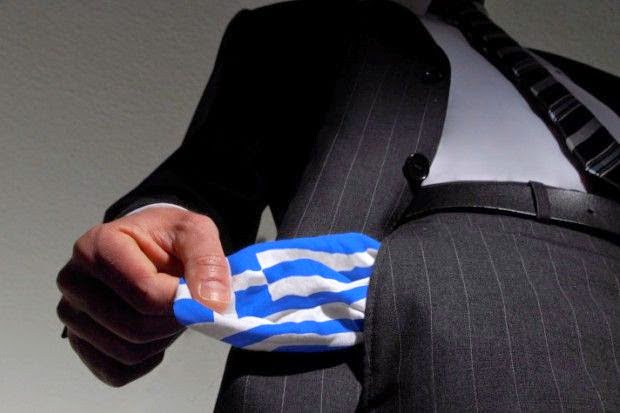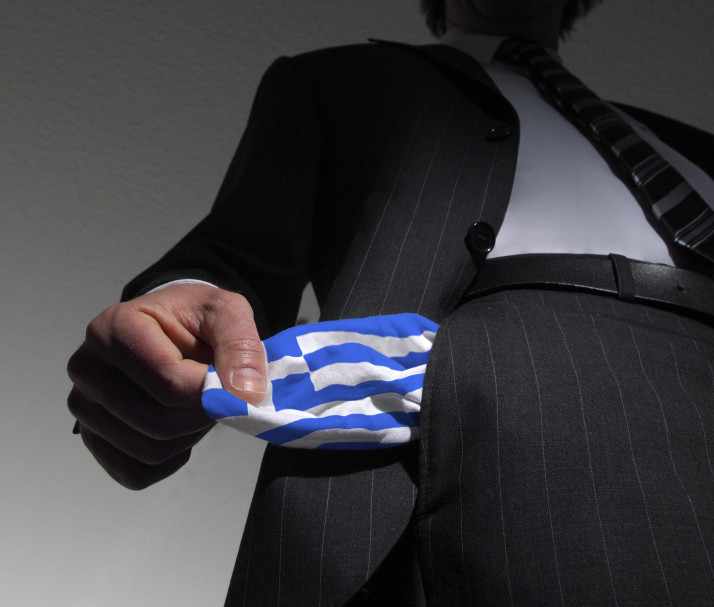Οι 12 που «κατέστρεψαν» την Ελλάδα

την έμφαση να δίνεται στα πρόσωπα που έπαιξαν καθοριστικό ρόλο στην
πορεία της χώρας. Και ειδικότερα από την αρνητική σκοπιά.
Βασιλιάς, η χούντα και οι εκφραστές της είναι ανάμεσα στα πρόσωπα που
εμφανίζονται στο αφιέρωμα του Politico. Μέσα σε αυτά είναι και Έλληνες
πολιτικοί που διετέλεσαν υπουργοί και πρωθυπουργοί, αλλά και
επιχειρηματίες, τόσο από τον χώρο των media, όσο και γενικά. Αξίζει να
σημειωθεί πως ξεχωριστό ρόλο και θέση έχει η τρόικα και γενικά η
πολιτική των δανειστών.
Κωνσταντής και Γεώργιος Μαυρομιχάλης

Τα δύο αδέρφια που δολοφόνησαν τον Καποδίστρια, βύθισαν τη χώρα στο χάος και, ουσιαστικά, οδήγησαν στην άφιξη του Όθωνα.
Ουίνστον Τσώρτσιλ

Χωρίς να αγνοούνται οι ευθύνες του Στάλιν, η στάση του ιδίου και της
Βρετανίας φέρει μεγάλο βάρος ευθύνης για τον ελληνικό εμφύλιο μετά τη
λήξη του Β’ Παγκοσμίου Πολέμου.
Κωνσταντίνος, τέως βασιλιάς της Ελλάδας

H αντιπαράθεση του με τον Γιώργο Παπανδρέου έπαιξε μεγάλο ρόλο για το πραξικόπημα του 1967.
Γεώργιος Παπαδόπουλος

Ο ηγέτης των πραξικοπηματιών που επέβαλε την επταετή χούντα. Οι
αναφορές του σε «ασθενή» και «γύψο» επανήλθαν στο πολιτικό λεξιλόγιο με
το ξέσπασμα της οικονομικής κρίσης.
Ανδρέας Παπανδρέου

Ο μακροβιότερος πρωθυπουργός της μεταπολίτευσης. Διόρισε ανθρώπους
του κομματικού μηχανισμού και ευνόησε τη μεσαία τάξη εις βάρος των
δημόσιων οικονομικών.
Κώστας Καραμανλής

Αν είχε περάσει λιγότερο χρόνο μπροστά στο Playstation, όπως
φημολογείται, ίσως τα πράγματα να ήταν διαφορετικά. Η εκτίναξη του
δημοσίου χρέους στα ύψη στα χρόνια της πρωθυπουργίας του και αμέσως
μετά, ήταν που ανάγκασε την επόμενη κυβέρνηση να αναζητήσει πρόγραμμα
διάσωσης.
Γιώργος Παπανδρέου

Έγινε πρωθυπουργός της χώρας τον Οκτώβρη του 2009, υποσχόμενος πως
«λεφτά υπάρχουν», παρά το ότι γνώριζε την οικονομική κατάσταση της
χώρας. Καθώς δεν μπορούσε να διαχειριστεί την κατάσταση, ο Παπανδρέου
ζήτησε πακέτο διάσωσης 110 δισεκατομμυρίων ευρώ από την ΕΕ και το ΔΝΤ,
έξι μήνες μετά.
Άκης Τσοχατζόπουλος

Θα μπορούσε να έχει γίνει και πρωθυπουργός της χώρας το 1996…
Έλληνες ολιγάρχες

Η ομάδα των ισχυρών Ελλήνων επιχειρηματιών χρησιμοποίησε τις
πολιτικές διασυνδέσεις της με τις συντηρητικές και σοσιαλιστικές πρώην
κυβερνήσεις για να κερδίσει τις συμβάσεις και να περιορίσει την ελληνική
αγορά. Ελέγχουν ένα μεγάλο μέρος των media στην Ελλάδα, σε μια χώρα
όπου η δημόσια ραδιοτηλεόραση παραμένει υπό τον έλεγχο του κράτους. Η
νέα κυβέρνηση του ΣΥΡΙΖΑ έχει υποσχεθεί να χαλιναγωγήσει τους ολιγάρχες,
αν και μερικά πράγματα είναι πιο εύκολα στα λόγια παρά στις πράξεις.
Πέτρος Κωστόπουλος

Το μήνυμα ανάμεσα στις γραμμές των κειμένων του ήταν εκείνο του
άκρατου καταναλωτισμού. Πολλαπλές πιστωτικές κάρτες, Καγιέν, διακοπές
για σκι, υπερβολικά δάνεια και ιδιωτικές πισίνες, που όλα έγιναν ακόμα
πιο εύκολα μετά το ευρώ, το 2001.
Νίκος Μιχαλολιάκος

Αν και είχε μια ιδιότυπη ασυλία, έως την δολοφονία του Παύλου Φύσσα,
σύντομα θα αντιμετωπίσει κατηγορίες για σύσταση και διεύθυνση
εγκληματικής οργάνωσης.
Τρόικα

εκτιμήσεις, επέβαλαν σκληρή λιτότητα στον ελληνικό λαό και ένα τεράστιο
κοινωνικό κόστος οδηγώντας τους ανθρώπους στην ανεργία και στη φτώχεια
The Dirty Dozen: 12 people who ruined Greece
OUT) Symbolic photo: national bankruptcy of Greece, high taxes, Man in a
suit with empty pockets in the national colours of Greece (Photo by
Classen/ullstein bild via Getty Images)
Syriza government and Greece’s international creditors, the blame for
the nation’s looming financial collapse would seem to rest entirely on
the shoulders of Prime Minister Alex Tsipras and Finance Minister Yanis
Varoufakis. But not really: History provides ample evidence that a long
line of leaders, from Winston Churchill to Constantine II,
helped make Greece the economic basket case it is today.
Konstantis and Georgios Mavromichalis (died 1831)
appointed independent Greece’s first governor in 1827, little did he
realize that the job would be tougher than his former post as Russia’s
foreign minister. Accustomed to working on the diplomatic stage,
Kapodistrias soon found that his vision of a modern Greek state was not
shared by everyone, especially the provincial elites.In
1831, he was stabbed in the stomach and shot in the head as he made his
way to church by Konstantis and Georgios Mavromichalis. The killing was revenge for Kapodistrias’s jailing of their respective father and brother, the warlord Petrobey Mavromichalis. His
assassination plunged Greece into chaos, leading the European powers to
impose a foreign king, the young Bavarian prince Otto, on the young
country, giving it a first taste of German rule.
movement managed to see the backs of the German army after three and a
half years of brutal wartime occupation. Unbeknownst of them, British
prime minister Winston Churchill and Soviet leader Joseph Stalin had
secretly divvied up eastern Europe and the Balkans on a piece of paper,
placing Greece within Britain’s sphere of influence. While communist
leaders also bear responsibility, Churchill’s determination to restore
the unpopular Greek monarchy, as well as his determination to exclude
former communist partisans from the new Greek army, pushed Greece
further down its calamitous path to civil war.
republic in 1974, its former king has had no role in political or public
life, to almost universal relief. Assuming the throne at the age of 23,
Constantine caused enough damage from 1964 to 1967. Soon, he found
himself at loggerheads with the centrist government, led by George
Papandreou, who eventually resigned. Constantine then sought to create
amenable governments using centrist party defectors, which fuelled a
constitutional crisis and political instability that ultimately led to
the 1967 military coup.
dealt a major blow in 1967 when a group of mid-level army officers, led
by Colonel Georgios Papadopoulos, staged a successful coup d’état. Seven
years of dictatorship followed, during which Papadopoulos himself was
deposed in a coup by hardliners. While Papadopoulos would later die in
prison, his asinine medical metaphors—he often likened himself to a
doctor trying to cure a sick patient (Greece)—were redeployed by
advocates of taking a tough line on Greece when crisis struck in 2009.
since the restoration of democracy in 1974, Andreas Papandreou left an
indelible mark on Greek politics and its economy. Over the course of his
decade in office (1981–89, 1993–96), the Harvard-trained economist
introduced long overdue social and progressive reforms and stacked the
civil service with his socialist Pasok party supporters. While he
elevated many Greeks to the middle class, that success came at the heavy
cost of drastically increasing the budget deficit and public debt
levels. As corruption scandals mounted in the late 1980s, Papandreou
created a sideshow by ditching his wife in favor of his airhostess
mistress.
Karamanlis became leader of the county largely on the strength of his
surname – his uncle was prime minister and president at various stages
from 1955 to 1995 – and because he promised to “re-establish” the
state. But in his five year tenure (2004–2009), few reforms were
enacted, and the government lost control of Greece’s public finances.
Had Karamanlis spent less time in front of his Playstation, as is widely
rumored, maybe things could have been better. The rocketing budget
deficit and debt-to-GDP ratio, which were continuously revised upward
during and after his rule, paved the way for the next government to ask
for a bailout.
George Papandreou (1952–)
grandfather before him, George Papandreou was elected in October 2009
using the vote-catching slogan “there is money,” despite being aware of
the county’s dire economic situation. Unable to manage the ensuing
fiscal crisis, Papandreou requested a €110 billion bailout deal from
European Union and International Monetary Fund six months later. To the
disbelief of most Greeks, the oblivious former leader attempted a
political comeback in the 2015 election, in which he campaigned on an
anti-austerity programme.
Akis Tsoschatzopoulos (1939–)
today had former interior minister Akis Tsochatzopoulos been successful
in his bid to become prime minister in 1996. Luckily, he only came
within six votes of replacing Andreas Papandreou as leader of the
socialist Pasok party. In 2013, a court sentenced Tsochatzopoulos, now
75, to life imprisonment for pocketing €55 million in kickbacks from
military procurements from 1996 to 2001, when he was defense minister.
His wife, ex-wife, daughter, cousin, and business associates were all
implicated in the scandal, most of whom were also jailed.
Greek oligarchs
cases, Greece’s oligarchs have emerged relatively unscathed from the
Greek crisis and continue to control vast wealth, which is largely
inherited but also derives from continued interests in shipping,
communications, banking, construction and public works. This coterie of
powerful Greek businessmen used political connections with former
conservative and socialist governments to win contracts and restrict the
Greek market. They also own and exert editorial control over most, if
not all, of the privately-held media companies, in a country where
public broadcasting remains largely under state control. The new
Syriza-led government has promised to rein in the oligarchs, but some
things are easier said than done.
Petros Kostopoulos (1954–)
Petros Kostopoulos gained fame during the media boom years in the 1990s.
He introduced a series of highly popular lifestyle magazines to Athens
that sought to break taboos and emulate urban fashions from more
affluent western countries. The underlying message in his publications
and editorials was one of unbridled consumerism. Cue the multiple credit
cards, Cayenne Porsches, skiing holidays, extravagant home loans, and
private swimming pools. All these status symbols became more attainable
after Greece, one of the poorest countries in the European Union,
adopted the euro in 2001, which gave its banks easier access to cheap
money.
Nikos Michaloliakos (1957–)
ago, Nikos Michaloliakos and his neo-Nazi Golden Dawn party have
capitalized on the Greek crisis to propel them to seats in the Greek and
European parliaments. Appearing immune from the police or the justice
system, Golden Dawn gangs patrolled inner-city streets, intimidating and
sometimes beating migrants and political opponents. Only after a Golden
Dawn supporter fatally stabbed the anti-fascist singer Pavlos Fyssas in
2013 did the state react by jailing Michaloliakos and several other
Golden Dawn leaders, who will soon go on trial on charges of forming and
running a criminal organization.
Troika
Commission, European Central Bank, and International Monetary Fund –
bears a fair share of the blame for Greece’s current state. The troika’s
programs are based on over-optimistic growth projections, which have
led to a number of revisions to Greece’s debt sustainability. Fiscal
austerity has imposed a huge social cost upon the Greek people, pushing
people out of work and into poverty, andleaving hundreds of thousands without access to public healthcare.














 Ακολουθήστε το
Ακολουθήστε το